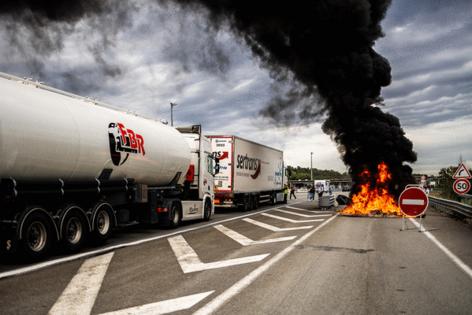Commentary: Why farmers are standing up against free trade
Published in Op Eds
My mom stood next to my grandfather, both of them crying as he emptied the bulk tank and dumped his milk in protest.
It was the 1960s, and dairy farmers in Wisconsin and elsewhere who were members of the National Farmers Organization were destroying their milk to cause shortages in supply chains and improve prices. They were desperate, struggling to make enough to support their families.
Fast-forward about six decades. Since 2023, farmers globally — from France to India — have been going to the streets to demand fair compensation for the food that they sell.
We should support these farmers and encourage lawmakers to pass policies that improve economic returns for food producers. Now, as free trade agreements are questioned more than ever, movements have the chance to push their national governments to make sure farming can pay the bills.
Farmers are protesting because, since the 1990s, groups such as the World Trade Organization have forced them into a global free trade system.
The WTO’s Agreement on Agriculture classifies policies according to the degree that they are “market distorting,” prompting governments to end initiatives that support incomes and set prices, allowing authorities to provide resources for limited initiatives such as disaster relief.
Moreover, the WTO’s 164 member states — led mainly by the United States and European countries — use the institution to open markets globally for economic growth.
Consider the U.S.’ case against Mexico dealing with high-fructose corn syrup.
In the late 1990s, Mexico claimed that U.S. imports of corn syrup would negatively impact their domestic sugar industry. The Mexican government placed tariffs on the product, which the U.S. appealed to the WTO. Seeing tariffs as market distorting, the WTO forced Mexico to lift its restrictions. A similar logic has governed the more than 600 other cases that have been brought before the WTO.
But times have changed.
Former President Donald Trump, guided by his America First policy, decided not to appoint new appellate judges to the WTO. Without judges to review cases, the institution became much less active. Trump also made tariffs a tool to support U.S. interests in global trade, which President Joe Biden’s administration has continued while also subsidizing certain domestic firms.
The global pushback on free trade defies ideological divisions of right and left. Farmers understand this, and they are demanding fair compensation both from center-left governments in France and Narendra Modi’s right-wing regime in India.
U.S.-based movements are also pushing for economic justice, which may be needed especially this year as farm incomes are slated to fall dramatically.
Restoring Country of Origin Labeling — which the WTO struck down in 2015 — is being proposed by groups such as the National Family Farm Coalition. Passing this legislation would help producers by making consumers aware of where their food comes from, which would help them support local producers. In the Milk from Family Dairies Act, the coalition is demanding more investment in local infrastructure for dairy farmers, increased oversight on dairy processors and a minimum floor price.
Protest means sacrifice, which my family knows well. Farmers around the world are taking time away from their farms to go to the streets and call for decent incomes that would help their families and local economies. Our lawmakers now have the chance to support them, promoting policies that just 10 years ago would not have seen the light of day.
____
Anthony Pahnke is the vice president of Family Farm Defenders and an associate professor of international relations at San Francisco State University in San Francisco. This column was produced for Progressive Perspectives, a project of The Progressive magazine, and distributed by Tribune News Service.
___
©2024 Tribune Content Agency, LLC.







Comments